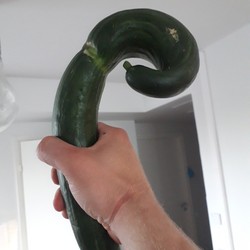I used to work in a warehouse that made a HUGE deal about the employees using the proper recycling bin so the company can get a nice check from somewhere or other for “going green”
This warehouse recieved thousands of pallets every day.
Each pallet is wrapped with hundreds of square feet of plastic wrap.
Each box is individually wrapped with maybe 10ftsq-50 depending on size.
Each box contains goods in plastic bags. Many of them with plastic clamshell packaging.
The products get unwrapped, and placed in larger boxes on shelves.
When the items get distributed to stores, the items were put in plastic bags, boxed up and wrapped in plastic wrap, boxes placed on pallets that were automatically wrapped by machines in hundreds of square feet of plastic.
None of the plastic from the warehouse floor is separated from the general waste.
Remember, it’s your responsibility to reduce waste.
I loathe the trend to blame the end consumer for their waste and eliminate very publicly visible things like straws when the vast majority is caused by industry every step of the way. The amount of plastic I see in retail garbage bins is sickening, and the average customer has no clue because it’s all long before anything ends up on the shelf.
Then people stop using plastic cutlery and think they’re helping the planet meanwhile it’s just a facade to keep the real wasters off their radar.
Also, I would LOVE to buy stuff not wrapped in plastic, but it doesn’t exist. There are no glass bottles of milk anymore, no soy-butcher
glass costs and weighs significantly more than plastic
that’s why plastic needs to be taxed, and sustainable alternatives subsidised, until it is the same or similar price to use…
I’ve seen the same or even worse. Pallets of stuff would be received, all wrapped up tight in an ungodly amount of plastic. The pallet would be unwrapped, plastic discarded and the contents scanned to confirm the correct items and number of items were present on the pallet. After each item was scanned and it’s serial number recorded, someone would go to validate the items. When validated and found to be correct, the items were again stacked on a pallet and wrapped by another ungodly amount of plastic. The terrible thing was, as I was outside of the distribution chain, I had a view on the bigger picture. Items would often go through several of these places, each doing the exact same. The amounts of plastic each item consumed in the process was huge. But it was necessary, errors were found often, so the steps needed to be done. And the pallets could often get wet, nobody would accept soggy cardboard, so it needed to be wrapped.
The issue is plastic is basically free and extremely good at what it does. A more permanent solution like encasing the goods in some other material, like wood or metal would be more expensive and do a worse job. It’s similar to asbestos, where the solution is so good, nothing else can compete. It took a mighty effort and strict laws to mostly abandon asbestos. I fear humanity has lost its will to live and won’t have it in us to ban single-use plastic.
Some places did use metal trollies instead of pallets, but the pallets were never really a problem. They were almost always made from sustainable woods, be re-used often, till they just about fell apart. After which they were sent out for recycling, either back into a refurbished pallet, or a stamped recycled wood pallet or other recycled wood product.
It’d be great if more and more companies packaged their foods through EcoEnclose or similar.
It’d be even better if this was made default by legislation that eliminates the need for good will.
I work in healthcare and sometimes I think about the amount of waste I generate in a day and it’s wild
Health of humans is always excluded from plastic reduction laws and for good reason.
Yes, I would rather healthcare and science used 5x as much plastic as they do already and everyone else had to go completely wasteless than try to put any undue limits on them.
deleted by creator
Tbf, I remember the times we reused everything, even tubes.
And it was a mess and there is so much evidence that the whole process of reusing is even worse for the environment.
Plastic recycling in the home is basically a scam, but at the scale of a hospital where you’re generating large amounts of the same (known) plastic that’s going in its own bin, it’s much easier to recycle. I just bought a bunch of recycled PET that mostly came from medical waste.
I mean, I’ve worked at a number of hospitals in the US and never seen a recycling receptacle for our waste. Our waste either goes in a biohazard bag to be incinerated, sharps containers to be disposed of (altho not sure in what way), or a regular trash can to presumably in a landfill.
Not sure if other countries are different, but I can’t imagine they sort through our biohazard waste bags for plastic materials.
Its a matter of scale. If labs went through pipette tips the same way that fast food joints went through plastic straws, they’d be banned too.
And we don’t throw pipette tips in the ocean, we throw them in the biohazard box. While not better for the environment, at least we don’t choke baby turtles.
The lab is a much more controlled environment. I trust a lab tech to dispose of the tips as per protocol, which could reduce the number of tips that end up as litter.
How many of them get incinerated? I know most large hospitals near me do that but do they take the waste from the gazillion small labs & diagnostics places?
In the three countries I worked in (netherlands, belgium and usa) all level 2 lab waste was collected in biohazard boxes and taken to special lab waste management. I assume they get the same treatment as hospital waste. We did have the non-biohazard labs in which pipettes just went in the normal trash. I assume you can’t get a biohazard lab approved without organizing special waste pickup.
No they wouldn’t. Banning straws is politically expedient, not effective policy. Straws are a tiny drop in the bucket of plastic waste. But they’re visible, largely optional, and have alternatives. It’s easy to make them look bad so a politician can look big by banning them. Your average person can feel like they’re making a difference by buying a reusable straw. The industrial scale plastic waste that happens out of sight is allowed to continue because nobody cares about actually doing anything. Everyone wants to feel like they’re doing something.
Some estimates claim that (life) science produces about 2% of worldwide plastic waste even though only 0.1% of the population works in this industry. I’m not sure how accurate these estimates are, but I find them believable considering how much waste I see every day in labs. On the upside, this waste usually stays in contained systems and doesn’t end up in the ocean.
To avoid plastic waste, they use now paper straws …wrapped individualy in plastic. Genius
People in America who use pipet tips: probably 10k People who use plastic straws: 300 mil
The straw thing seems like such an inconsequential place to start over things like switching to bar soap and bar shampoo to avoid using so many plastic bottles.
All you need to do is walk on the side of a busy road and look in the ditch to see what people just throw away.
It’s not a lot of shampoo bottles, but tons of plastic cups and accompanied straws.
Anecdotes aren’t a great way to measure this. Observations like this are variable by location, and ignores the much larger mass in landfills or unrecycled stockpiles.
And observations of landfills or unrecycled stockpiles doesn’t vary by location?
The idea was to try and remove plastic waste that people tend to just throw away without thinking much of it. Lab students don’t exactly take pipets with them and throw away in a ditch. But unfortunately, way too many people just throw away single use plastics like straws, cutlery, cups, “paper plates”, etc.
I didn’t make any such “observations”, or even claim that it doesn’t vary by location. I’m just pointing out that your approach ignores a lot of much larger plastic masses. It’s ok for identifying some obvious opportunities, but I’d hesitate to call it definitive for the purposes of establishing the most impactful strategy.
I’m not sure if people’s unmindfulness is responsible for a larger share of waste than indifference, but maybe?
I’m not ignoring anything. But if you want me to cover every single issue and aspect of various types of trash management, it’s gonna be a god damn university essay, I don’t even think lemmy would allow so many characters in a comment.
Peoples “unmindfulness” is responsible for every single piece of garbage you see around you. When I walk down the road and see a bag of crisps laying around. That’s because a person just tossed it. And no. I’m not ignoring corporate waste or pollution, criminal or otherwise. But that isn’t the topic right now.
This specific post was making fun of the straw bans vs other single use plastics that are seemingly fine. straws vs pipets used in labs. And what I said was that pipets are not being littered around every corner of the globe. But straws are. That’s why movements to ban such implements are ongoing. That’s why we have movements to ban single use plastics like straws and cutlery, while a plastic shampoo bottle is still “fair game” since they’re not typically just tossed in nature.
That doesn’t mean I’m just ignoring everything else. We also didn’t talk about how armed robberies are bad. But I can assure you, I’m not ignoring them, they’re just not the topic at hand.
Look, all I’m saying is that straws probably aren’t the #1 source of discarded plastic, and it seems like focusing on one thing like that results in more performative than substantive change.
Ah yes, the good old, “It’s not the #1 problem so why bother doing anything”. It’s that wonderful kind of attitude that simply doesn’t get anything done, ever. Because there’s always a bigger problem.
The only ones focusing on one thing like plastic straws, are people like you. The rest of us moved on
How much shampoo are you going through???
Think of it in scale. It’s not just you. It’s millions of people. Even if every household only used one bottle over one year that still would be tons of tons of (easily to avoid) waste. And of course it’s a lot more than one bottle a year.
Because you can’t say the same thing about straws or other single use plastics?
How much plastic is in a bottle of shampoo vs a straw, even averaged by day?
Sounds like that’s something you should have the numbers on if you’re making the claim.
Yeah that’s a reasonable expectation. I’ll just start a massive study to see if people use so many straws that it outweighs every other use of plastic in their life. You’ve totally got me there. Congrats.
Edit: That was sarcasm. The burden of proof that straws are the most impactful discarded plastic is on you, not on my skepticism of it.
Nooooooooo please oh no, pleasee, you can’t make me use bar soap please noo.
I seriously hate it, maybe saving the planet is not worth it after all /j…= but also those bottles are refillable while straws are not only single use but are thrown away way more often.
You do you. I switched to bar shampoo and I like it so much more!
bar shampoo gets a no from me, I have a HORRIBLE amount of hair/skin oil (genetic) and if I don’t wash my hair for even 1 day it looks like an absolute mess.
good news is that when I’m older I’ll have absolutely glorious hair though lol
I use bar shampoo and body wash. Daily, because i sweat a lot (genetics too).
I use bar stuff because i have to shower daily. It prevents so much waste, because i work through soap fast, so at least i am not producing plastic waste.
If you have to wash your hair a lot, thats an argument for bar shampoo, not against.
My hair is also excessively oily, and I wash it daily with bar shampoo.
Get back to me when bar shampoo has medicated variants and doesn’t fucking suck.
Yeah, not everyone can do it, but I have no reason to doubt that most can, but we’re really getting hung up on a single example here, people.
How about deodorant? How many people use deodorant in a cardboard container instead of plastic?
Plastic nowadays is inevitable, but at least the use of biodegradable plastic made from modified natural pulps is growing. Plastic is just a generic term for artificial materials and not all of them are harmful, and a lot of these also can be easy recycled. PET are often converted to filaments for 3D printers or yarns for clothing. Bad only if they are thrown into nature or into the sea
Ah, but you must see that recycling costs money! It’s cheaper to pretend you’re recycling and just throw it in the oceans and rivers and landscapes!
I hate it here. We even throw out online returns nearly 100% of the time for all it’s worth, it’s fucking crazy.
Straws don’t pollute the oceans if you throw them in the trash. Well, unless that trash gets processed badly. Where I live trash gets burned. So I make sure to throw some straws in the river so the sea turtles can do coke off each others backs 😎
Good luck choking sea turtles by throwing straws in the river. The only turtles you’ll choke that way are the river turtles
Where do you think the river goes?
Who cares? out of sight, out of mind.
The river turtles collect the plastic straws and bring them downstream to the sea turtles. Basic nature stuff.
How about people driving those trucks that directly dump mixed waste into the ocean? That’s a very common thing to do in South-East Asia. Plus, there are a zillion villages everywhere around there that dump all of their mixed waste into creeks going through them – to be brought “away”. Into the oceans.
That’s where almost half of all microplastic comes from. Then there’s the other approximately half that comes from cars’ tyres. And then a part of a percent that comes from drinking straws and such. Hooray.
I recently saw paper straws for sale in a carboard box with a cutout so you could physically touch the straws. Naturally, I was revolted.
My headcanon says that this used to have a plastic window instead, until someone pointed out that having a plastic window in packaging of paper straws is ridiculous, so they decided to remove it. A package redesign without a window was also proposed, but was rejected for budgetary reasons.
There is no way i can imagine such box that makes sense.
People that use single use straws more likely require bulk and large numbers of single use items should never be economically expensive to produce.
In large enough numbers a thin plastic wrap could work though i prefer a kleenex sized box.
Biodegradable “plastic” too expensive for that?
deleted by creator
I am just assuming but would this not very dependent on the like of work?
Its probably fine for most things but lets say forensic lab or virus research?
Like seriously, we save SO much money on tips.
Researchers shouldn’t have to live off of tips.
lab rats who use a pipette robot that eats boxes of tips:

Recycling companies who ship bottles to India landfills/sea because recycling too expensive:
Simple. Don’t throw them in the ocean. Why are you throwing them in the ocean?
LoL. Just autoclave them














